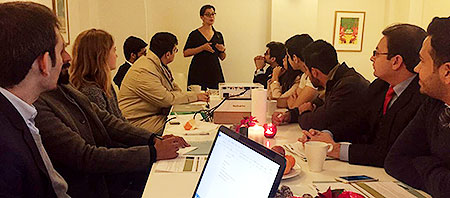
MYPs arrive in Denmark; get orientation on Danish Democracy, Accountability Structures and Labour Policy
YPP Study Visit
November 29, Copenhagen, Denmark; The first day in Denmark began with the Members of Youth Parliament Pakistan receiving briefings on the Danish Parliamentary System, Accountability Structures and Labour Policy.
Members of the Youth Parliament were given an introduction to the DANIDA Fellowship Centre (DFC) by Ms. Maya Lindberg Brink, Capacity Development Advisor, DANIDA Fellowship Centre. She highlighted that the organization is dedicated to investing in individuals and organizations across the world by connecting them through different training programs. An important foreign policy concern of Danish Government of ‘Aid to Trade’ was also highlighted during the session, through which the Danish Government is aiming to create synergies between both these aspects of foreign policy with developing, middle-income countries in areas particularly such as sustainable energy. Mr. Erik Bryld, Managing of Director of Tana, a development consultancy also engaged on the Study Visit, concluded the introductory session by welcoming the Delegates and sharing his views on policy development.
Following that, Professor Flemming Juul Christensen, currently teaching Government and Politics at the Rosklide University Centre, Copenhagen, Denmark, gave the MYPs a brief introduction to Danish democracy. Professor Flemming covered details on the unique demography of Denmark which has a population of 5.7 million, 1.3 million of which is resides in the capital, Copenhagen. MYPs were informed about the fact that losing wars, especially in the 19th century was the biggest reason, which led to Denmark being a very homogenous and introverted country. He also highlighted that the three major, current issues of debate in Danish politics are the size of the public welfare sector, immigration, and taxation. Especially immigration is a dividing political issue for the Danish political system, which also figured in the recent change of Government in Denmark that took place two days ago.
A particular area of interest for the MYPs was the possibility of a political party, not having a significant majority in the Folketing, the Danish Parliament, being able to form a single-party Government. Professor Flemming highlighted that in order to form a Government in Denmark, a political party does not need to have the majority in the Parliament. Instead, it only needs to not have the majority against it. This was perhaps the best example of Denmark’s negotiated and consensus based democracy.
Ms. Nanna Schnipper, Consultant at the Supreme Audit Institution gave the delegates a briefing on the Danish Supreme Public Accountability Institution- that is, the ‘Rigsrevisionen’, where she is working as an Advisor. She explained that the Rigsrevisionen audits the government accounts and examines whether the government funds are administered in accordance with the decisions of the Parliament. For the purpose, the Rigsrevisionen reports to the Danish Public Accounts Committee, but has retained a unique independence and credibility.
The institution primarily audits the state accounts, regional accounts and accounts of government financed activities, included EU-funded activities. For the purpose, it conducts three types of audit, including the Financial Audit, the Compliance Audit and the Performance Audit. The Performance Audit is a unique function of the institution, where it audits the efficiency of various Government initiatives, such as analyzing the utility of the current state welfare system over the years, or suggesting improvements in Denmark’s civil and criminal legal procedures to reduce the time for delivery of justice.
Therefore, the Rigsrevisionen grows beyond the premier public audit institution of Denmark, and actually becomes a source of constructive policy reform.
Particularly interesting for the Members of the delegation was the fact that the Rigsrevisionen also audits any and all accounts and expenditures by the Defence institutions, Law Enforcement Agencies and Intelligence Agencies in Denmark, the reports on which are made public. When asked by the MYPs that whether in a country with peculiar security concerns, unlike Denmark, there is any utility in such openness and transparency, Ms. Schnipper emphasized that this was critical, at the very least to the extent that the Parliamentarians should have access to the expenditure, and audit reports of security and defence agencies.
With regards to the anti-corruption activities of the Rigsrevisionen, she emphasized that the emphasis was on prevention, rather than criminal investigation for the institution. When asked by the MYPs that what happens when the Rigsrevisionen discovers any financial irregularities in the workings of a government department, Ms. Schnipper stated that the matter is simply reported to the police, which then leads the process under a special prosecutor. This ensures the credibility of the Rigsrevisionen amongst the Danish population and the political leadership.
Given that Denmark was the best rated country in the Transparency International’s Corruption Perception Index for 2015, the MYPs were particularly surprised to the know that there is not a dedicated anti-corruption watchdog in the country. Rather, the Rigsrevisionen serves the function, which in essence is an auditing institution. Drawing comparisons with Pakistan’s case, where there are dedicated organizations for the purpose, such as the National Accountability Bureau, with significant powers, the MYPs concluded that simply the creation of public institutions, and granting them overarching powers, is not the solution to the scourge of corruption. Rather, this also involves complex challenges like constituting a corruption free culture, making sure that the accountability institutions are not subject to political controversy and expediency, etc.
The last session of the day was conducted by Mr. Rasmus Raabjerg Nielsen, Member of Danish Confederation of Trade Unions (LO). He briefed the young people of Pakistan about the workings of the LO, which essentially is a confederation of Denmark’s 18 main labour unions. Delegates learnt that there are no statutory labour laws in Denmark, including on minimum wage. The Government only legislates on the required conditions in workspaces. Instead, the system rests upon continued negotiations and consensus, and mutual recognition between the employers and the employees in this regard through dedicated organizations such as the LO. The LO’s affiliated unions have about 1.1 million members, and almost 75% of the Danish workforce is represented by it.
He also informed the Members of the Delegation that collective agreements are legally binding in Denmark and can be enforced by the court.
During the session, the MYPs also tackled challenging technical concepts of the Danish labour system such as Flexicurity that espouses flexible regulations on hiring and firing. The MYPs were told that unemployment insurance and active labour market policy ensures that the relatively higher levels of labour replacement do not affect an individual.
The YPP Study Visit will continue in Denmark for the next three days, where the delegates will interact with youth activists, visit the Danish Parliament and will understand the education system of the country.
Members of 8th Youth Parliament Pakistan who are part of the Study Visit include: Mr. Abdur Rehman (YP3-54-ICT01) Deputy Speaker, Third session, Ms. Afia Waheed Khan (YP2-13-PUNJAB02) Deputy Speaker, Second Session, Mr. Azeem Armaghan (YP4-53-ICT01) Leader of the Opposition, Fourth Session, Mr. Basharat Ali (YP1-59-GB02), Ms. Bakhtawar Komal (YP4-06-KP02), Mr. Bilawal Bin Nasir (YP2-17-PUNJAB06), Mr. Faizan Daud (YP1-15-PUNJAB04), Leader of the House, First Session, Mr. Iftikhar Khan (YP4-55-FATA01), Mr. Irtaza Haider (YP1-18-PUNJAB07), Mr. Masood Ur Rehman (YP1-02-BALOCHISTAN02), Mr. Muhammad Usama (YP4-48-SINDH09), Mr. Nadir Khawaja (YP4-58-AJK01) Chairperson Youth Standing Committee on Finance, Fourth Session and Syed Muhammad Raza Zaidi (YP1-49-SINDH10). PILDAT officials accompanying the Delegation include: Muhammad Saad, Projects Manager, PILDAT.
The Youth Parliament Pakistan, a PILDAT initiative, is aimed at inculcating in youth of Pakistan values and spirit for democracy, the importance of dialogue, tolerance for others’ views, an understanding of the concept of Parliament and its role in democratic decision-making and oversight. The current programme is supported and financed by the Danish International Development Agency, Embassy of Denmark, Islamabad, who have been supporting the YPP since 2010.
For further information & details:
Website: www.youthparliament.pk
Email: info@youthparliament.pk
Twitter: @YouthParlPak
Facebook: www.facebook.com/YouthParlPak
